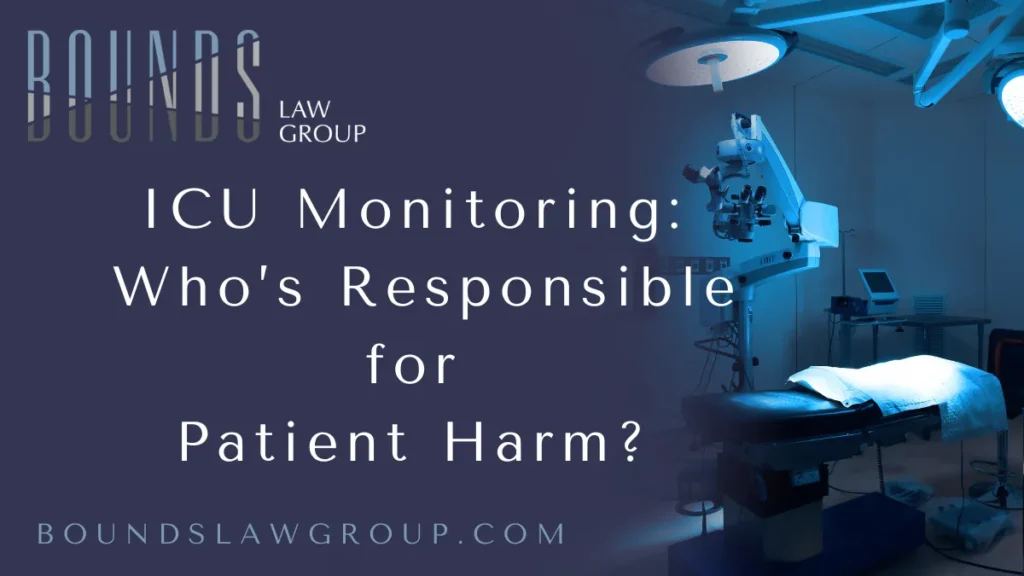
The Role of an ICU Negligence Attorney
When a loved one is admitted to an Intensive Care Unit (ICU), families place their trust in the hands of highly trained healthcare professionals. These environments are designed for critically ill patients who require constant and sophisticated medical attention. However, even in these high-stakes settings, medical negligence can and does occur — often with devastating consequences. When this happens, an experienced ICU negligence attorney at Bounds Law Group can help victims and their families seek justice.
Contact us now at 877-644-5122 or complete the free case evaluation form for expert legal assistance.
Common Forms of ICU Negligence
The ICU is a dynamic and fast-paced environment where even minor oversights can have catastrophic outcomes. Some of the most frequent types of ICU negligence include:
Failure to Monitor Vital Signs
Continuous monitoring of heart rate, blood pressure, oxygen levels, and respiratory function is a fundamental standard in any ICU. When nurses or medical staff fail to act promptly on abnormal readings, the result can be severe patient deterioration or death. Our seasoned ICU negligence attorneys have successfully represented clients in cases where delayed responses to alarming vitals resulted in organ failure, strokes, and irreversible brain injuries.
Misuse or Malfunction of Medical Equipment
ICU patients are surrounded by sophisticated machines — ventilators, dialysis machines, infusion pumps — that require proper setup, monitoring, and maintenance. Misuse of these devices due to staff inexperience or oversight is an unfortunately common form of ICU negligence. When equipment is not calibrated correctly or malfunctions go unaddressed, patients can suffer unnecessary harm.
Medication Errors in the ICU
Administering the wrong medication or incorrect dosage in an ICU setting can result in life-threatening allergic reactions, overdose, or drug interactions. The ICU negligence attorneys at Bounds Law Group have deep experience identifying breakdowns in communication between physicians, pharmacists, and nurses that contribute to such errors.
Failure to Prevent Hospital-Acquired Infections
ICUs are breeding grounds for infections due to the invasive procedures many patients undergo. Ventilator-associated pneumonia, catheter-related bloodstream infections, and surgical site infections often stem from improper sanitation and lack of adherence to infection control protocols. These infections, though preventable, can prolong recovery or even result in death.

Who Is Legally Responsible for ICU Negligence?
Determining liability in ICU negligence cases requires comprehensive investigation and legal expertise. The responsible parties may include:
- Hospital administrators who fail to maintain adequate staffing levels or properly train employees.
- Physicians who misdiagnose conditions or fail to order necessary tests or interventions.
- Nurses and ICU staff who do not adhere to standard monitoring protocols.
- Medical equipment manufacturers in cases involving defective devices.
At Bounds Law Group, our ICU negligence attorneys work with a team of medical experts to evaluate ICU records, staff behavior, equipment logs, and hospital policies to pinpoint the cause of the negligence and identify every liable party.
Signs That ICU Negligence May Have Occurred
Family members may not always know what to look for, especially during a crisis. Some red flags indicating potential ICU negligence include:
- Sudden and unexplained deterioration in patient condition.
- Lack of updates or vague explanations from medical staff.
- Visible signs of infection at catheter or surgical sites.
- Unexpected medication changes or side effects.
- Discrepancies in patient charts or missing documentation.
If you suspect any of these warning signs, it is critical to speak with an ICU negligence attorney immediately. Acting quickly can preserve vital evidence and protect your legal rights.
The Legal Process for ICU Negligence Claims
When you contact Bounds Law Group, our ICU negligence attorneys begin with a thorough consultation to understand your case. From there, we will:
- Review medical records and hospital protocols.
- Engage independent medical experts to evaluate the standard of care.
- Interview witnesses and ICU staff when applicable.
- File a formal claim against all negligent parties.
- Pursue fair compensation through negotiation or litigation.
Compensation in these cases may include medical expenses, pain and suffering, loss of income, funeral costs, and loss of companionship in wrongful death claims.
Why Choose Bounds Law Group for Your ICU Negligence Case
With decades of experience in medical malpractice litigation, the ICU negligence attorneys at Bounds Law Group have recovered millions for clients who suffered due to medical mistakes. We approach each case with surgical precision, focusing on detailed evidence collection and expert collaboration. Our mission is not only to win your case — but to hold the healthcare system accountable and prevent future harm to others.
The Impact of ICU Negligence on Long-Term Recovery and Quality of Life
ICU negligence can extend far beyond the immediate injury or harm caused by medical errors. In many cases, patients who suffer from negligence in these critical care environments face long-term consequences that can affect their physical, emotional, and financial well-being. These effects often last for years, or in some instances, can be permanent.
Physical Consequences of ICU Negligence
The long-term physical impact of ICU negligence varies depending on the nature of the error. For example:
- Brain injury or cognitive impairment: A failure to monitor brain activity or oxygen levels can lead to severe neurological damage. In cases of hypoxia (lack of oxygen), the brain can be deprived of the oxygen it needs to function properly, resulting in permanent cognitive deficits.
- Loss of mobility or independence: A failure to prevent complications such as pressure sores (bedsores), blood clots, or infections can lead to significant mobility challenges. Long stays in the ICU, especially in patients with already compromised health, can result in muscle atrophy, reducing the patient's ability to walk or perform daily activities.
- Organ failure: Mismanagement of medical equipment or improper monitoring can lead to organ failure, requiring lifelong treatment, including the need for dialysis or ongoing respiratory support.
Emotional and Psychological Effects
In addition to the physical toll, ICU negligence can also have profound psychological effects. Patients who survive ICU errors may experience:
- Post-traumatic stress disorder (PTSD): The trauma of being subjected to medical errors in a high-stress environment can leave patients struggling with anxiety, flashbacks, and sleep disturbances. In some cases, PTSD can lead to ongoing psychological distress that impacts their quality of life for years to come.
- Depression and loss of confidence: Prolonged physical limitations and the fear of re-entering the healthcare system due to prior negative experiences can lead to depression, frustration, and a loss of self-esteem. The emotional toll can be equally as debilitating as the physical injury itself.
Financial Burden and Loss of Quality of Life
The financial impact of ICU negligence is significant. In addition to immediate medical costs, patients may face the following:
- Ongoing medical treatment and rehabilitation: Many victims of ICU negligence require extensive medical follow-up, including therapy, rehabilitation, and ongoing medications, all of which come at a substantial cost.
- Loss of income: If the negligence results in long-term disability or reduced physical ability, patients may be unable to return to work or sustain their previous income levels. This loss of income can place families in difficult financial situations, often resulting in further stress and hardship.
- Loss of enjoyment and independence: ICU negligence can rob individuals of their ability to enjoy everyday activities or perform basic tasks independently. This loss of quality of life is often devastating, as many victims of ICU negligence may find themselves unable to participate in hobbies, work, or family events.
In such cases, it’s essential to work with an experienced ICU negligence attorney who can ensure that all aspects of the harm caused — both immediate and long-term — are accounted for in any legal claim. At Bounds Law Group, we are committed to helping families recover compensation that addresses not only the current medical bills but also future medical care, lost income, and the profound emotional toll these situations take on victims.

Don’t Delay — Time Limits Apply
In Florida, as with many states, medical malpractice claims are subject to strict statutes of limitations. That means you must file your case within a specific time frame from the date of injury — or potentially lose your right to recover damages. Early legal intervention is critical. The longer you wait, the harder it becomes to obtain complete medical records, witness testimony, and electronic monitoring logs that can prove negligence.
Start Your ICU Negligence Claim Now
If you believe that a loved one was harmed due to ICU negligence, we urge you to take immediate action. Complete our free case evaluation form or call us now at 877-644-5122 to speak directly with an experienced ICU negligence attorney at Bounds Law Group. We are here to help you navigate this complex and emotional legal journey with compassion, skill, and results-driven advocacy.
Sources
- National Institutes of Health – Medical Errors in the ICU: This study reviews common types of ICU-related errors, including medication mishaps and failure to monitor, offering critical data for legal review.
https://www.ncbi.nlm.nih.gov/pmc/articles/PMC3432920/ - Agency for Healthcare Research and Quality (AHRQ): A government resource offering detailed insights on hospital-acquired infections and preventable adverse events in intensive care settings.
https://www.ahrq.gov/patient-safety/index.html - The Joint Commission – Sentinel Event Data: The Joint Commission publishes data on serious medical errors, including those involving ICU equipment and patient monitoring failures.
https://www.jointcommission.org/resources/patient-safety-topics/sentinel-event/

